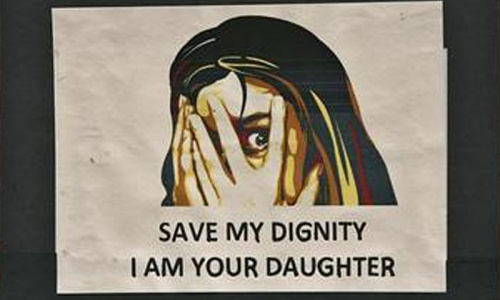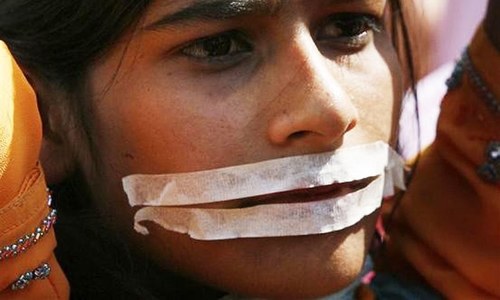The recently approved Punjab government's “Punjab Protection of Women Against Violence Act of 2016” appears at first glance to be a heroic effort to protect women victims of violence.
In a nutshell, it contains the following protection mechanisms:
- a district protection committee
- a helpline
- women protection officers
- protection centres and shelter homes
- various remedies of orders of protection
- residence and monetary support for victims
These are all commendable. More importantly, it signifies lawmakers’ alertness to the fact that most laws enacted to enhance women’s rights and their protection are not effectively implemented.
But on a closer reading, there are gaps that leave one wondering: what level of consultation did the bill undergo?
Many are celebrating the fact that the bill passed — despite resistance from some quarters — which is hardly a a viable defence. Because legislation acquires a degree of permanence (until future amendment and repeal), it must undergo rigorous review that is made open and transparent to all.
Some have already pointed out the positives and the flaws.
The act does not create a new crime of domestic violence
One can only wishfully think that the legislature had in mind a less penal and more rehabilitative society.
However, it may just be that the assembly did not have the political fortitude or commitment to explicitly label “domestic violence” for what it is — a crime.
Read the full text: The Punjab Protection of Women Against Violence Act 2016
The result: victims will have to seek justice in cases of domestic violence within the ambit of assault, wrongful confinement, criminal intimidation, and harassment provisions of the Pakistan Penal Code and other statutes.
Examine: Abuse and hush money — Pakistan's domestic workers caught in a dangerous cycle of violence
It does, however, create new offences in case a defendant violates a monetary, residence, or protective order under the Act. Perhaps, unnecessarily — in light of how under-reported and condoned domestic violence is — it also criminalises false complaints.
Protecting all victims of violence?
Since the overwhelming majority of victims of domestic violence globally are women, it is unsurprising that the law purports to protect women only and, in fact, its preamble refers to the constitutional protection for women.
Take a look: Violence against women ‘most rampant’ in Punjab
In contrast, the Domestic Violence Law in Sindh extends its protection to not just women, but also vulnerable men, the elderly and children in the context of a domestic relationship.
This makes it more in sync with the notion that violence is often rooted in socio-economic power imbalances within a family.
By not limiting the law and its protection to cases of domestic violence only (but to cases of vaguely defined “violence”), the assembly has been overly ambitious with the side effect of creating a watered down statute that undermines the seriousness that should be accorded to domestic violence and its prevalence in Punjab.
Violence is defined as any,
"Offence committed against the human body of the aggrieved person including…domestic violence, sexual violence, psychological abuse, economic abuse, stalking or a cybercrime."
The section further elaborates that,
“Psychological violence includes psychological deterioration…which may result in anorexia, suicide attempt or clinically proven depression resulting from defendant’s oppressive behavior.”
The act leaves terms “oppressive behavior” and “sexual violence” undefined. Besides being awkwardly worded, there is no rationale behind listing three specific conditions as opposed to referring to a whole range of psychological symptoms that battered women may suffer.
See: Is domestic violence less prevalent in arranged marriages?
Its definition of “domestic violence” is also plain and does not list — as in the case of the Sindh statute — a whole pattern of behaviour that one can more precisely recognise as domestic violence including insults, possessiveness — the all too common threats of divorce, abandonment and accusations of immorality.
Shelters not jails
This is a significant step and deserves inspection. After all, most women are trapped in abusive situations because they are not financially independent and cannot find alternative accommodations that suit their standard of living.
Thus in empowering courts to grant “residence orders” where the defendant (abuser) would have to arrange for alternative housing (within his means) and pay rent is commendable.
Women can also be placed in shelters. But then, in a later section, the court is given authority to compel the defendant to pay for the cost of a woman’s shelter (rent and meals) in a shelter home.
Non-payment would mean that the defendant is in contempt of court and the justice system is continually embroiled in monitoring payment thus straining its time and resources — or it would have the effect of exhausting women victims and causing them to give up.
Explore: Online harassment of Pakistani women turns into real-world violence
Moreover, nothing is said on whether a woman’s residence in a shelter would be impacted by the defendant’s non-payment.
State-run shelters (Dar-ul-Aman) have often been criticised as being jail-like, where women’s mobility is monitored, their character regarded as suspect and their entry and exit mandated by a court order.
Thus, it is discouraging to note that there hasn't been a more incisive attempt to re-imagine shelters as truly safe spaces for women, who should be free from the government’s judgemental glare.
A regressive provision that provides for “discipline” and regulation of visitation and timings reflect a parochial and paternalistic attitude and the state’s desire to control women who've left their home and their mobility.
Ironically, limiting a woman’s mobility is one of the things the ambivalent act seeks to curb.
Moreover, boys over 12 cannot be admitted to shelter homes with the mothers. One would expect a modern statute to forge creative ways to retain family unity and keep children, regardless of age and gender with a mother who has already become partially isolated.
Women are safeguarded from wrongful eviction from their home — which is why it is bewildering that the act also holds that wrongfully evicted women can only be reinstated to her previous status in the house if she has a “right, title or beneficial interest in the house”.
If the words are given a restrictive interpretation, then in case she does not have a proprietary interest in the house, that may affect her ability to re-enter her marital home.
The parameters of a protective order include that the defendant surrender any weapon or firearm which the defendant lawfully possesses.
Surely, it is poor drafting and not parliamentary intent to allow abusers to hold on to their illegally obtained weapons, but that won’t stop devious lawyer-ing around a lacuna.
Protective orders also allow courts, in some cases, to require that defendants wear GPS trackers and ankle bracelets.
This is also worrisome in light of the state’s heightened and over zealous enthusiasm towards surveilling and criminalising its ordinary citizens and carries potential for abuse.
Good laws, bad implementation
The law envisions the formation of a “District Women Protection Committee” in each district to ensure that the protection system is working. Committee tasks include arranging volunteers, training, referring cases from police to protection centers and reconciliation.
The cynical may say that other committees prescribed by law, such as District Committees on the Status of Women, are yet to be functional in most districts — and here, we have yet another law and yet another committee, and thus infinite allegations of non-implementation.
View: The Pakistani women risking all to fight for their rights
Moreover, by making membership in committees (envisioned to perform gargantuan tasks) volunteer-based, the state is setting the stage for compromised and inconsistent service delivery dependent upon the enthusiasm and time of the volunteers.
The act accounts for women protection officers and many of their tasks seem duplicative to those of the committees, then why can’t the government just have numerous such paid positions doing the work of the committee.
Women do need jobs, after all, and the system would be more accountable.
Even more problematic is the fact that these committees can accept donations to carry out their functions. Instead of the Punjab government allocating robust budgets, they expect members to be ambassadors of the official begging bowl, and to be tested on their fund-raising skills.
Read: Prime-time shame
Of course this would also inevitably lead to problems implicit in handling and managing funds and lay the process of protecting women susceptible to the accusation that it represents donor agenda, rather than being a local priority and urgency.
Provincial and national legislatures, before further legislative activity, should review the entire process of consultation, make it thoroughly democratic and inclusive of all voices, review all provincial laws with a view towards inter-provincial consistency and coherence, take stock through concerted research on how institutional and attitudinal barriers can be conquered.
The last seven years have seen a good number of laws enhancing women’s rights and protection in Pakistan, and while this is highly commendable, the government needs to take stock of why implementation has failed every time.






































